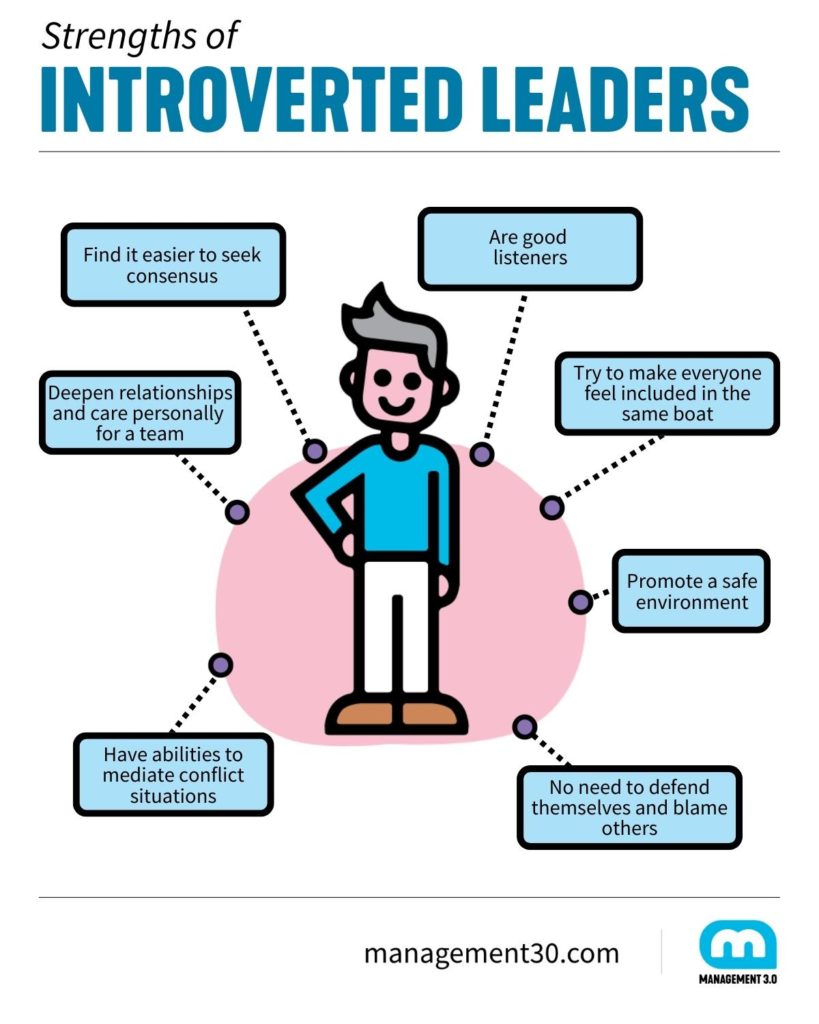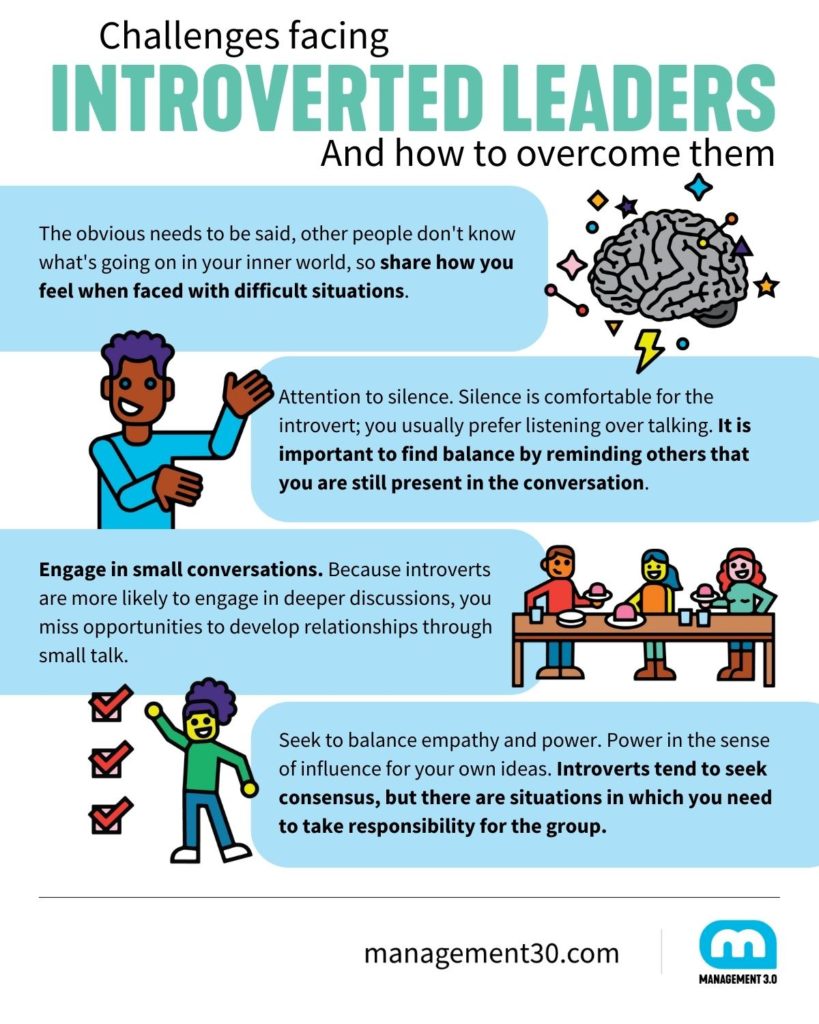Do you consider yourself an introvert, or do you recognize introverts in your work team? According to research carried out by various academics, introverts represent a large proportion of employees. So whether you are an introverted person or not, the following content should enhance your leadership journey. An article by Management 3.0 Facilitator Fabiana Mello.
Introverts vs. Extroverts
In everyday language, it is common to confuse introversion with shyness or reclusion, but introversion is not synonymous with shyness.
According to Myers and Briggs, an introvert is energized by their ideas, images, and memories, namely, their inner world. Extroverts, on the other hand, are more focused on what happens externally.
Shyness refers to preoccupation with social judgment. So yes, an introvert can also be shy, but not necessarily. Watch out! Don’t confuse the two.
If the following statements apply to you, welcome to the introvert club:
- I am seen as reflective or reserved;
- I am comfortable being alone, and I like things I can do alone;
- I prefer to know very few people;
- Sometimes I spend much time thinking, and I don’t take action quickly enough;
- Sometimes I forget to check with the outside world to see if my ideas really align with reality.
| Introverts | Extroverts |
|---|---|
| Energized by ideas, images, memories | Focused on what happens outside |
| Reserved and quiet | Communicative and sociable |
| Good listeners and only speak when necessary | Listening is more challenging than talking |
| Usually don’t express their emotions | Express their feelings easily |
Can Introverts be Leaders?
A survey by Karl Moore, a professor and researcher at McGill University in Canada, reveals that among 400 CEOs who took part in the survey, approximately one-third recognized themselves as introverted. Among front-line leaders, the percentage of introverts is even higher.
Some strengths traditionally attributed to introverts are the qualities of listening, analysis, and reflection, especially when compared with extroverts. Extroverts are typically good at establishing positive social relationships and enthusiastically championing their ideas.
Historically, extroverts are recognized as better leaders and favored in hiring processes and promotion decisions. Displaying essential qualities for exercising leadership, extroverts may tend to become command centers and take the lead in discussions.
Considering the context we live in today ̶ volatile, unpredictable, uncertain, and ambiguous ̶ introverts tend to listen more attentively and be receptive to suggestions, thus creating advantages for themselves and their team members.
In an experiment by Adam Grant, Francesca Gino, and David A. Hofmann, introverted leaders made team members feel valued and motivated to get the job done.
It is essential to avoid harmful stereotypes. Each human being has unique characteristics, as well as gifts, talents, and qualities that can contribute to interpersonal relationships and that are independent of their behavioral preferences.
There is no better or worse personal profile, only those who can use their qualities to best deal with the needs of each context.
One thing is for sure: introverted leaders must seek to engage extroverts by being more active in the listening process.

Famous Introverted Leaders
Simon Sinek, a world-renowned author and speaker recognizes himself as an introvert.
Besides him, there are many others, but I want to share some that can become inspirational examples for you, while also revealing those you maybe didn’t know were introverted people.
- Nelson Mandela: I’ve certainly read more than ten books about his trajectory, and one of the characteristics that stands out the most in his personality was his ability to listen and establish consensus in conflict situations;
- Barack Obama: recognized for inviting people to sit down and ponder his ideas;
- Mahatma Gandhi: icon of resistance promoting the principles of non-violence, he persuaded others gently, and his ideas still influence the world today;
- Steven Spielberg: one of the most influential personalities in Hollywood recognizes himself as an introvert;
- Warren Buffett: according to Buffett, when he started his career, he had the intelligence for business, but needed to develop the ability to relate to other people and influence them.
Founders and co-founders of tech giants like Apple, Meta, and Amazon are avowedly introverted. In an article for the New York Times in 2010, Sheryl Sandberg stated that Mark Zuckerberg is shy and introverted and is often perceived as not very warm to those who don’t know him, when, in fact, he is perceived by those close to him as friendly.
Strengths of Introverted Leaders
Both introverts and extroverts have typical characteristics for being great leaders, however let’s highlight some advantages of introverted leaders here:
- Introverts are good listeners;
- They try to make everyone feel included in the same boat;
- As they are reflective, they don’t feel the need to defend themselves and blame others;
- Introverted leaders promote a safe environment for people to hear each other;
- Have the abilities to mediate conflict situations;
- Deepen relationships and care personally for a team;
- Introverts find it easier to seek consensus and a place to share their ideas.
Of course, we are talking about stereotypes and that doesn’t mean that extroverts can’t develop these traits as well, but, for introverts, these qualities are more natural.
Challenges Facing Introverted Leaders
As a seasoned introvert, I can’t just stick to the perks of being an introvert, so let’s review the challenges facing introverts – and what you can do to overcome them:
- The obvious needs to be said, other people don’t know what’s going on in your inner world, so share how you feel when faced with difficult situations;
- Attention to silence. Silence is comfortable for the introvert; you usually prefer listening over talking. It is important to find balance by reminding others that you are still present in the conversation;
- Engage in small conversations. Because introverts are more likely to engage in deeper discussions, they miss opportunities to develop relationships through small talk;
- Seek to balance empathy and power. Power in the sense of influence for your own ideas. Introverts tend to seek consensus, but there are situations in which you need to take responsibility for the group, especially as a leader.
Advocacy and engagement are complementary rather than opposing ways of advancing complex challenges.
Adam Kahane
Introverts on the Team?
If you’re an extrovert and you’ve stuck with me this far, you might wonder what to do to deal with introverts on your work team.
- Encourage introverts to share their ideas, creating a safe environment for exchange;
- Introverts need time to digest information and share their ideas, if possible, share materials and schedules in advance;
- Remember: introverts need time to themselves and privacy to recharge their energy, avoid getting them involved in tasks where they need to be in a group all the time. Days filled with meetings are incredibly taxing for introverts.
Beware of stereotypes and labels. Introverts are not necessarily shy, but they are definitely more reserved. If you’re an extroverted leader, remember that an introvert doesn’t have the same traits and needs as you, but that doesn’t mean they don’t work well in a team, either. We are all social beings.
An introvert will not become an extrovert and vice versa, but dealing with diversity and embracing everyone’s potential is what can ensure the team’s success.

Manage the system, not the people
Introverts make up half to a third of the population, so even if you think of yourself as an extrovert, you’re sure to have introverted people on your team. In Management 3.0, one of the perspectives which promotes a happier and more productive work environment is to Energize People, keeping them creative, active, and motivated. And here lies the challenge of respecting differences and welcoming what represents the best environment to stay engaged and motivated for each individual. An extrovert needs external motivation; an introvert looks for motivation in their inner world.
Susan Cain, in her research, found that most organizations prioritize a nurturing environment for extroverts, forcing introverts to feel guilty for wanting to be alone. A personality-focused culture invites us to prove our worth through our charisma and magnetism, based on the model of great salespeople. We are not purely introverts or extroverts; we all have a little bit of both. Otherwise, we would be ineffective. However, we must develop work environments that favor a balance between the two preferences and allow us to express ourselves authentically. Below are some suggestions inspired by Susan Cain’s video on TED:
- Stop the constant group work madness. This is not to say that we don’t have to work together, but we also need time for our ideas and deep thoughts to surface.
- Go to nature. We don’t need to isolate ourselves and stop living with each other, but we can find times when we can disconnect and contact ourselves more often. Remember that hiking is even one step of the 12 Steps for Happiness!
- Share your ideas and talents. Maybe this is easier for extroverts, but introverts, the world needs you and the skills you carry too!
My suggestions based on Management 3.0 for you
Some practices of the Management 3.0 toolbox can help to nurture a work environment that respects and integrates the differences between preferences. So here are some suggestions for you:
Moving Motivators
One of my favorite games. Reflecting and talking about what motivates each person can reveal what is truly important to them.
Diversity Index
How about applying the diversity index focusing on behavioral preferences? A good excuse for each one to understand a little about the others.
Personal Map
The personal map reveals a little of each person’s history, and experiences and can bring to light many of their preferences regarding the work environment.
Feedback Wrap
If you have questions about behaviors related to introversion or shyness, what do you think about sharing what you observe, how you feel, and developing an empathic and assertive dialogue?
Niko-Niko Calendar
Notice how people have been feeling. If there is any unease between behavioral preferences and the role they play on the team, it is very likely that this is reflected by not-so-pleasant days.
The possibilities are certainly not limited and by participating in the Management 3.0 workshops, you will discover many other options and establish your own list of favorite tools and games in this context.
This topic is so important and interesting that we could continue reflecting on it ̶ which for an introvert, is pure fun. Still, I want to conclude this article by inviting you to consider being aware that each of us observes the world through a unique lens. This lens includes the experiences of biography, the beliefs and values that have been developed along this journey, and behavioral preferences, which include introversion or extroversion.
We are unique, therefore, if we want to develop work environments in which people can act independently and contribute to the achievement of a common purpose based on their talents, we need to provide conditions for our worldview to expand and welcome the differences.
Other References:
- www.inc.com/john-rampton/23-amazingly-successful-introverts-throughout-history.html
- hbr.org/2021/01/can-introverts-thrive-in-extroverted-careers
- hbr.org/2015/11/how-to-be-good-at-managing-both-introverts-and-extroverts
Header Photo by Bethany Legg (via Unsplash)








